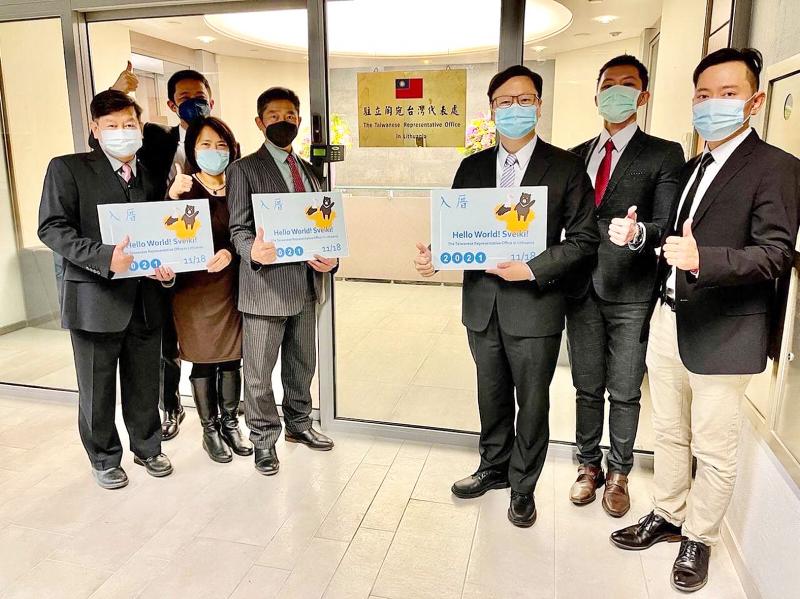The European Commission said it does not consider the opening of a Taiwanese representative office in Lithuania a breach of the EU’s “one China” policy, after Beijing downgraded its diplomatic ties with Vilnius because of the move.
“We have made clear in contacts with China and in public statements that this is predominantly a bilateral matter between China and Lithuania, but also since the summer, the EU has stood by Lithuania in the face of sustained coercive measures from China,” a European Commission spokesperson said on Sunday.
China downgraded diplomatic ties with Lithuania on Sunday, after Taiwan opened a “Taiwanese Representative Office in Lithuania” in the nation’s capital on Thursday.

Photo: AFP / Taiwan’s Ministry of Foreign Affairs
Taiwan’s representative offices in countries without formal relations mostly use the word “Taipei,” to avoid referring to the nation itself, which angers China.
Lithuanian Prime Minister Ingrida Simonyte on Sunday said that the opening of the representative office, which does not have formal diplomatic status, should not have come as a surprise to anyone.
“Our government’s program says Lithuania wants a more intense economic, cultural and scientific relationship with Taiwan,” she said. “I want to emphasize that this step does not mean any conflict or disagreement with the ‘one China’ policy.”
Lithuanian lawmaker Zygimantas Pavilionis was quoted by the Baltic News Service as saying that the more pressure Beijing asserts on Lithuania, the more it would repel the free and democratic world.
Minister of Foreign Affairs Joseph Wu (吳釗燮) yesterday praised Lithuania for its “moral courage” in allowing Taiwan to open the representative office, despite mounting pressure from China.
Wu also denounced China’s reaction as “rude and unreasonable.”
The opening of the office is meant to enhance Taiwan’s relations with the Baltic state on various fronts, including economic, trade and cultural exchanges, he said on the sidelines of a legislative session.
Asked by lawmakers if the next step for Taiwan would be to seek to establish official diplomatic relations with Lithuania, Wu said that his ministry’s priority is to promote closer bilateral relations.
Wu said the office had just opened, and the next step for his ministry would be to lay the foundation for further practical exchanges between the two countries.
“Establishing official diplomatic relations is currently not the main focus of our work,” he said.
Taiwan has 15 diplomatic allies, and only one of them, the Holy See, is in Europe.

SECURITY: As China is ‘reshaping’ Hong Kong’s population, Taiwan must raise the eligibility threshold for applications from Hong Kongers, Chiu Chui-cheng said When Hong Kong and Macau citizens apply for residency in Taiwan, it would be under a new category that includes a “national security observation period,” Mainland Affairs Council (MAC) Minister Chiu Chui-cheng (邱垂正) said yesterday. President William Lai (賴清德) on March 13 announced 17 strategies to counter China’s aggression toward Taiwan, including incorporating national security considerations into the review process for residency applications from Hong Kong and Macau citizens. The situation in Hong Kong is constantly changing, Chiu said to media yesterday on the sidelines of the Taipei Technology Run hosted by the Taipei Neihu Technology Park Development Association. With

A US Marine Corps regiment equipped with Naval Strike Missiles (NSM) is set to participate in the upcoming Balikatan 25 exercise in the Luzon Strait, marking the system’s first-ever deployment in the Philippines. US and Philippine officials have separately confirmed that the Navy Marine Expeditionary Ship Interdiction System (NMESIS) — the mobile launch platform for the Naval Strike Missile — would take part in the joint exercise. The missiles are being deployed to “a strategic first island chain chokepoint” in the waters between Taiwan proper and the Philippines, US-based Naval News reported. “The Luzon Strait and Bashi Channel represent a critical access

‘FORM OF PROTEST’: The German Institute Taipei said it was ‘shocked’ to see Nazi symbolism used in connection with political aims as it condemned the incident Sung Chien-liang (宋建樑), who led efforts to recall Democratic Progressive Party (DPP) Legislator Lee Kun-cheng (李坤城), was released on bail of NT$80,000 yesterday amid an outcry over a Nazi armband he wore to questioning the night before. Sung arrived at the New Taipei City District Prosecutors’ Office for questioning in a recall petition forgery case on Tuesday night wearing a red armband bearing a swastika, carrying a copy of Adolf Hitler’s Mein Kampf and giving a Nazi salute. Sung left the building at 1:15am without the armband and apparently covering the book with a coat. This is a serious international scandal and Chinese

COUNTERINTELLIGENCE TRAINING: The ministry said 87.5 percent of the apprehended Chinese agents were reported by service members they tried to lure into becoming spies Taiwanese organized crime, illegal money lenders, temples and civic groups are complicit in Beijing’s infiltration of the armed forces, the Ministry of National Defense (MND) said in a report yesterday. Retired service members who had been turned to Beijing’s cause mainly relied on those channels to infiltrate the Taiwanese military, according to the report to be submitted to lawmakers ahead of tomorrow’s hearing on Chinese espionage in the military. Chinese intelligence typically used blackmail, Internet-based communications, bribery or debts to loan sharks to leverage active service personnel to do its bidding, it said. China’s main goals are to collect intelligence, and develop a